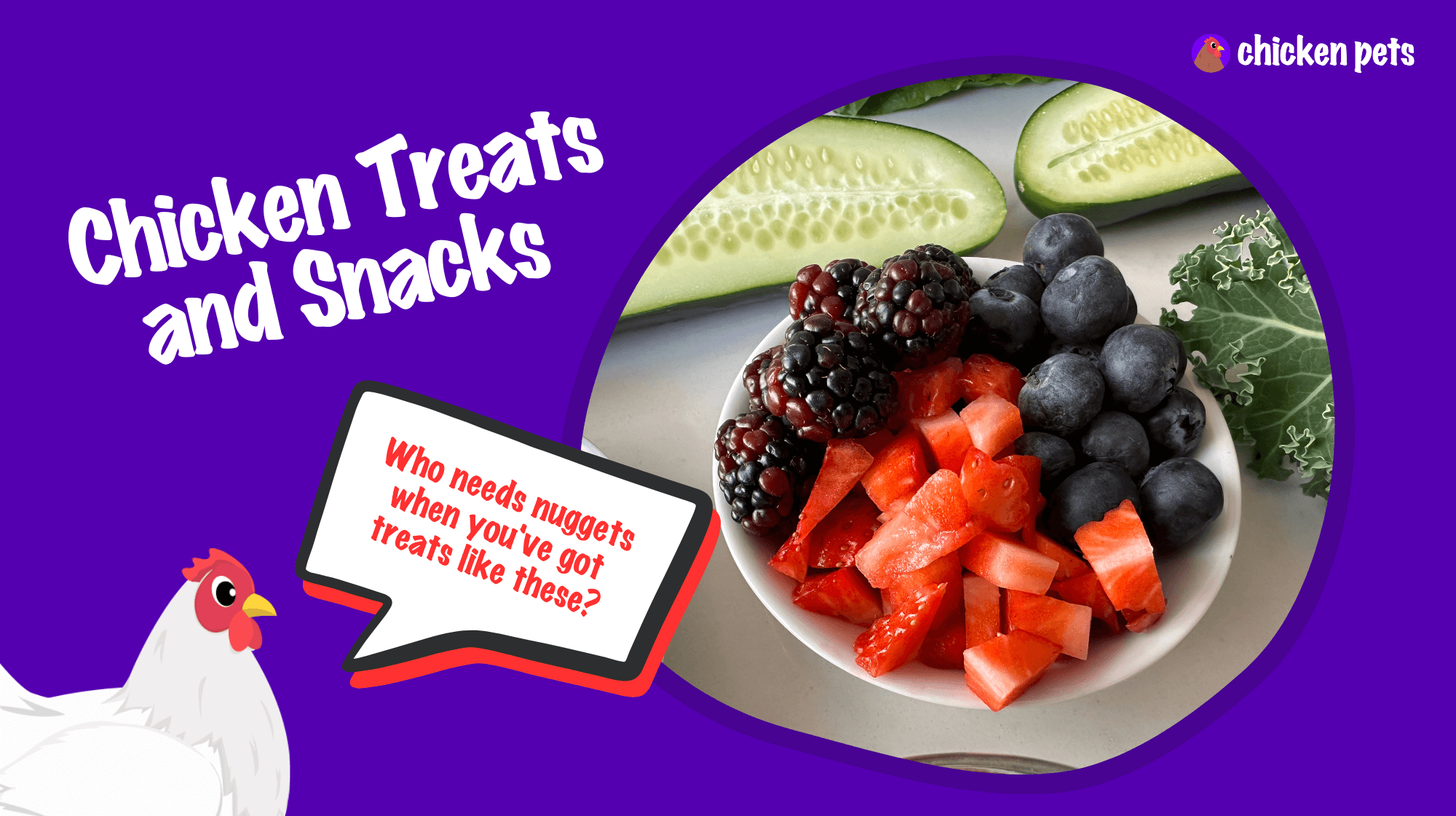Feeding treats and snacks to backyard chickens can be a fun and rewarding way to supplement their diet and provide them with mental stimulation and entertainment. However, it’s essential to do so in moderation and with appropriate food choices to avoid potential health risks.
The 90/10 rule for feeding chickens snacks.
The 90/10 rule for chicken feed is a good guideline to follow when feeding chickens treats and snacks. This means that 90% of their diet should come from their regular chicken feed, while the other 10% can be made up of treats and snacks. This ensures they get all the essential nutrients they need to stay healthy.
What scraps can chickens eat?
Chickens are omnivores and can eat various foods, including kitchen scraps and leftovers. Feeding your chickens scraps can be a great way to supplement their diet and provide additional nutrients while reducing food waste.
Vegetables. A great treat!
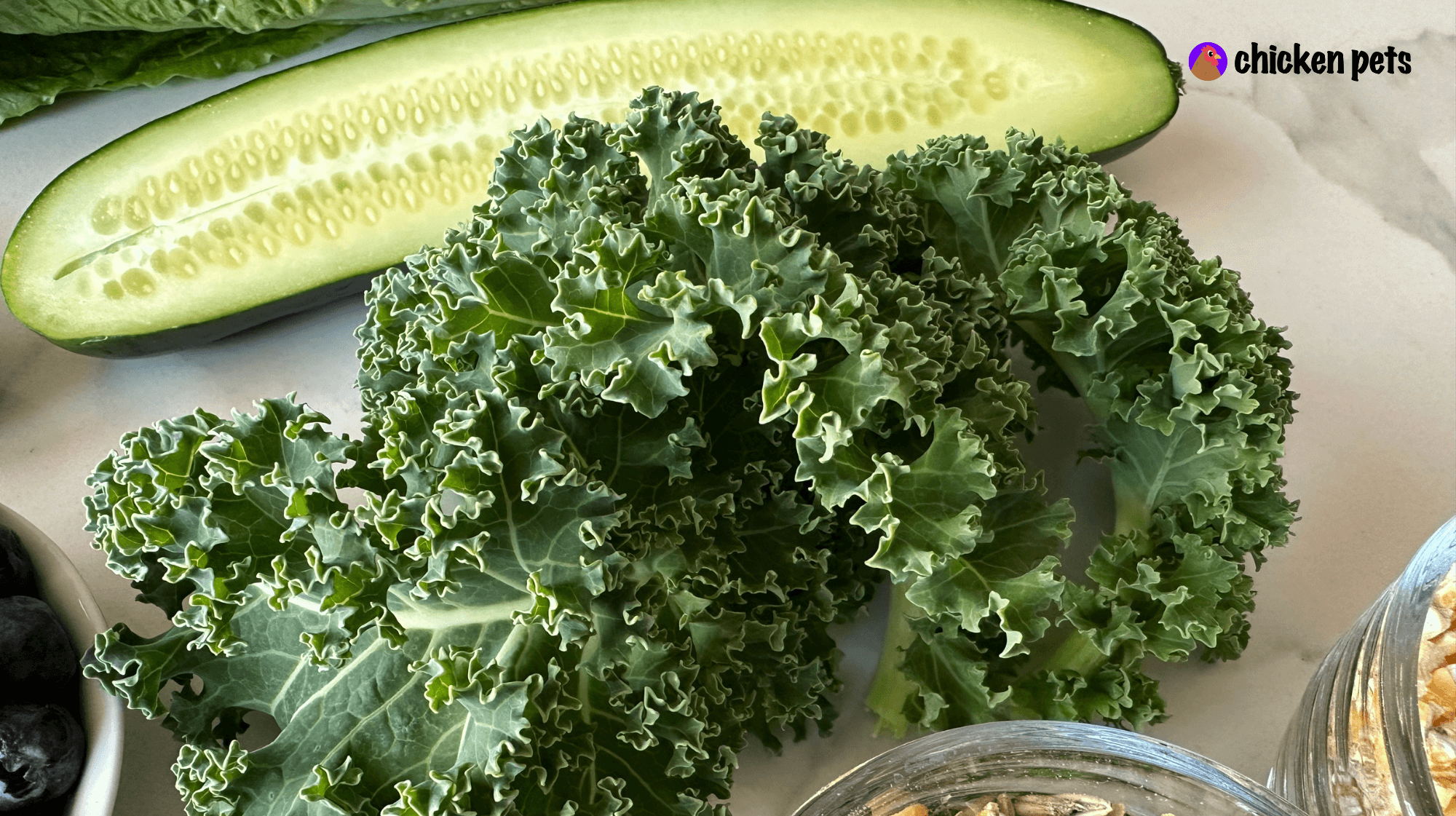
Vegetables are essential to a chicken’s diet, and chickens can enjoy many safe and nutritious vegetables. Kale and cucumbers are two vegetables that many chickens love, and they provide essential vitamins and minerals that chickens need to stay healthy. Kale is an exceptionally nutritious vegetable with calcium, vitamin C, and antioxidants, and Cucumbers are also a good source of vitamin C, fiber, and water.
In addition to kale and cucumbers, there are many other vegetables that you can feed your chickens. Leafy greens like spinach and collard greens are also high in vitamins and minerals, while carrots and sweet potatoes provide a good source of beta-carotene. Squash, zucchini, and pumpkin are also great vegetable options for chickens, as they are high in fiber and low in calories.
When feeding vegetables to your chickens, it’s important to remember to chop them into small, bite-sized pieces to make them easier to eat. It’s also a good idea to avoid feeding them vegetables high in oxalic acid, such as rhubarb or spinach, as they can interfere with calcium absorption. Overall, feeding your chickens a variety of safe and nutritious vegetables as part of a balanced diet will help keep them healthy and happy.
Fruits. Chickens love ’em.
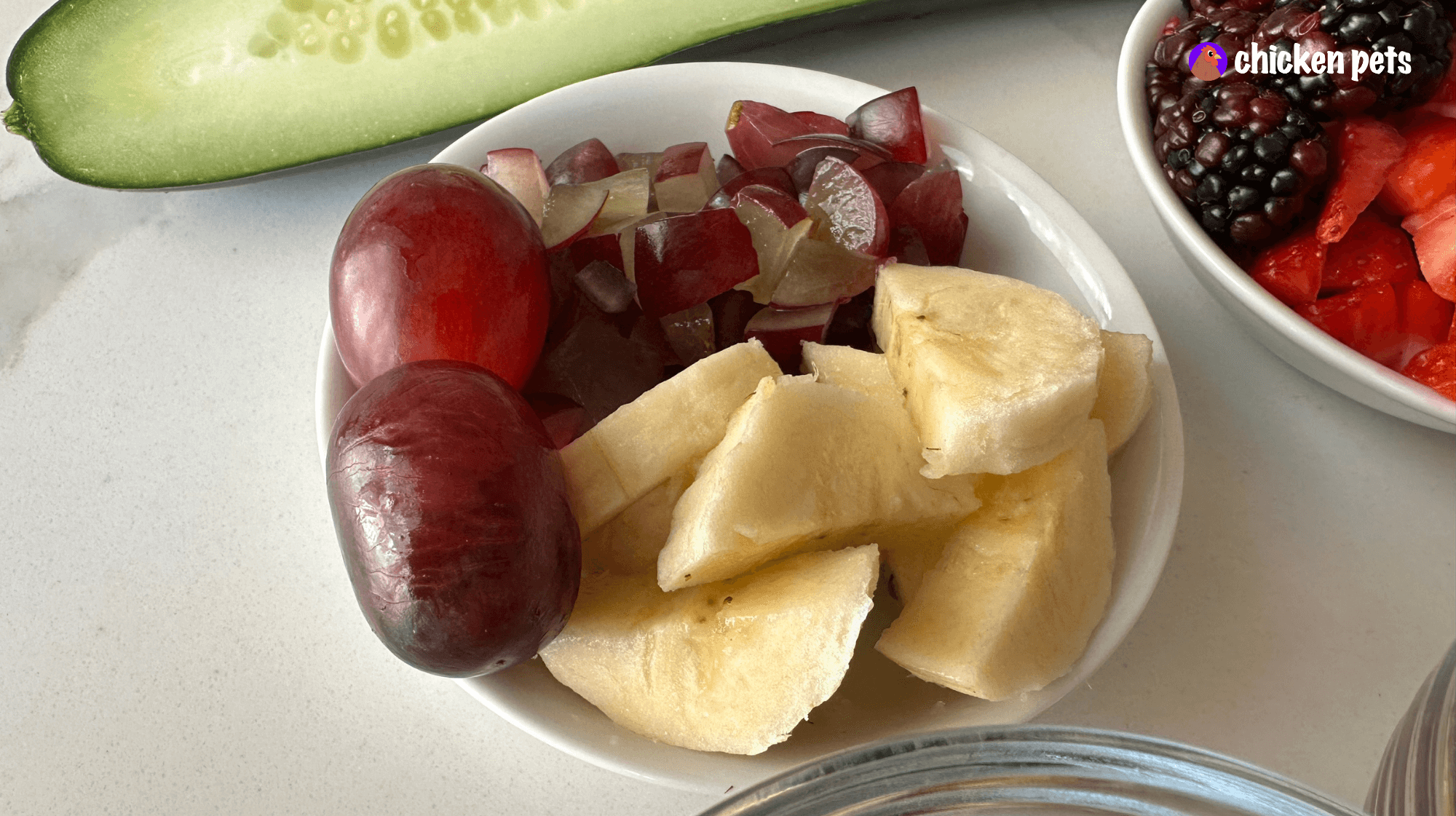
Fruits are a great addition to a chicken’s diet and can provide essential nutrients and vitamins. Chickens are not picky eaters when it comes to fruits and can enjoy a variety of options. Some safe and tasty fruits for chickens include strawberries (without the tops or leaves), watermelon, cantaloupe, blueberries, grapes (cut up), bananas, and apples (without the seeds or core). Additionally, many chickens love mushed-up berries like raspberries and blackberries, which are great antioxidants.
While some citrus fruits like oranges and grapefruits are safe for chickens to eat in small amounts, it’s best to avoid feeding them large quantities, as they can upset their digestive system. Additionally, chickens may not even like the taste of these fruits, so it’s not worth risking any potential health issues. It’s important to remember that while fruits can provide essential nutrients and vitamins, they should only make up a small portion of a chicken’s diet.
Feeding too much fruit can lead to obesity and other health issues, so it’s best to offer a balanced diet that includes a variety of foods like vegetables, grains, and protein sources. When feeding fruits to chickens, it’s important to chop them into small, bite-sized pieces to make them easier to eat and to avoid feeding them any fruits with mold or spoilage.
Protein and worms.
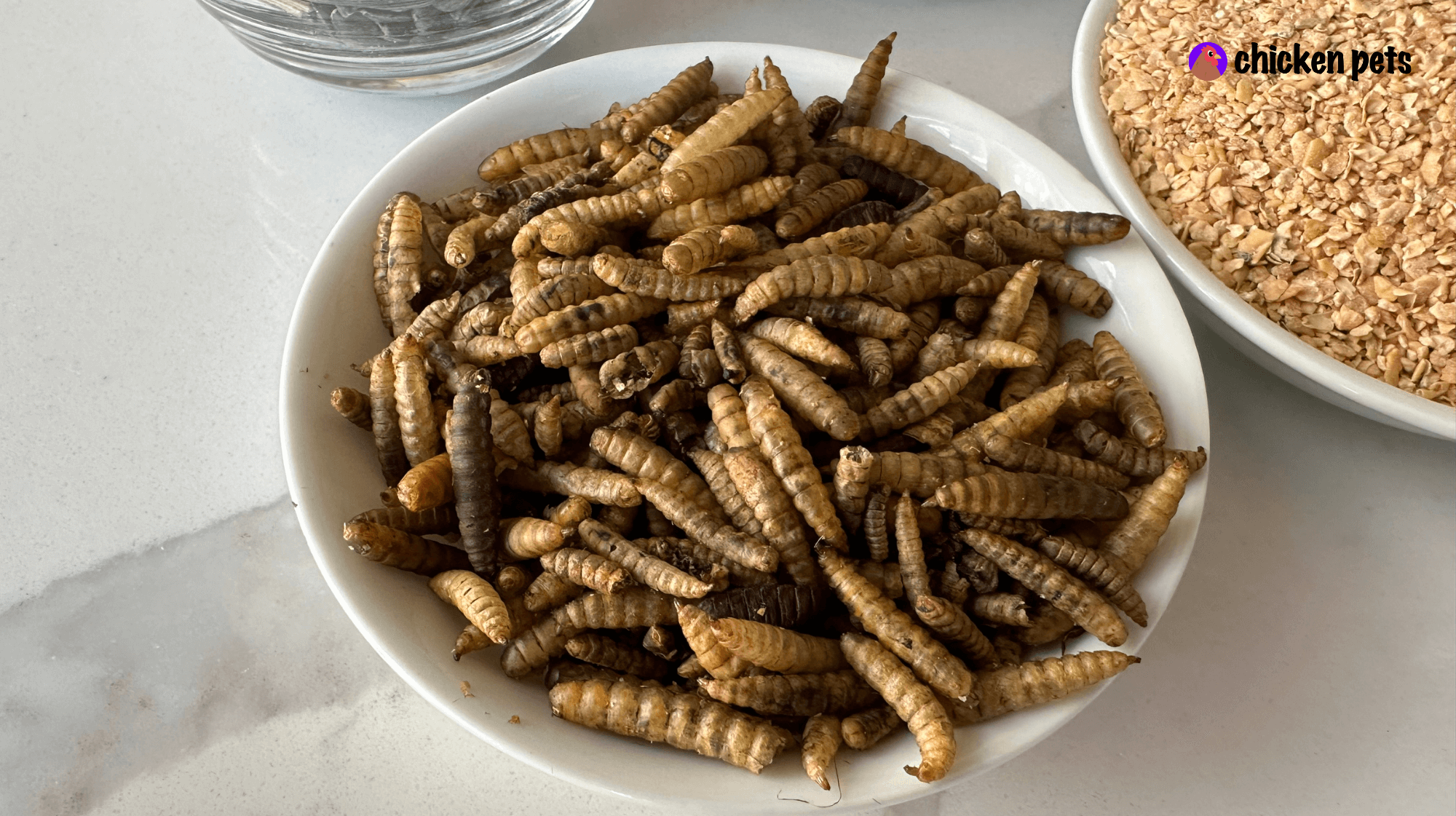
Protein is an essential component of a chicken’s diet, and there are many safe and nutritious protein sources for chickens to eat. Cooked beef and chicken are okay for chickens to eat in small amounts, as they provide a good source of protein. Cooked eggs are also an excellent protein source for chickens, and they can be fed either whole or as scrambled eggs. Cooked or raw fish can also be provided to chickens if it hasn’t gone bad. However, it’s important to avoid feeding raw beef, chicken, fish, or eggs to chickens, as they can be contaminated with harmful bacteria that can cause illness.
In addition to meat and eggs, there are many other sources of protein that chickens can enjoy. Many chickens love crickets, earthworms, grubs, mealworms, and black fly larvae. These insects are not only high in protein, but they also provide essential vitamins and minerals. If you’re uncomfortable feeding live insects, you can find dried or freeze-dried versions at pet stores or online.
It’s important to remember that protein should make up only a tiny portion of a chicken’s diet, as too much protein can cause health problems. It’s also essential to monitor your chickens for any signs of digestive issues or illness when introducing new protein sources into their diet. Feeding your chickens a well-balanced and varied diet that includes protein, fruits, vegetables, and grains will help keep them healthy and happy.
WE RECOMMEND
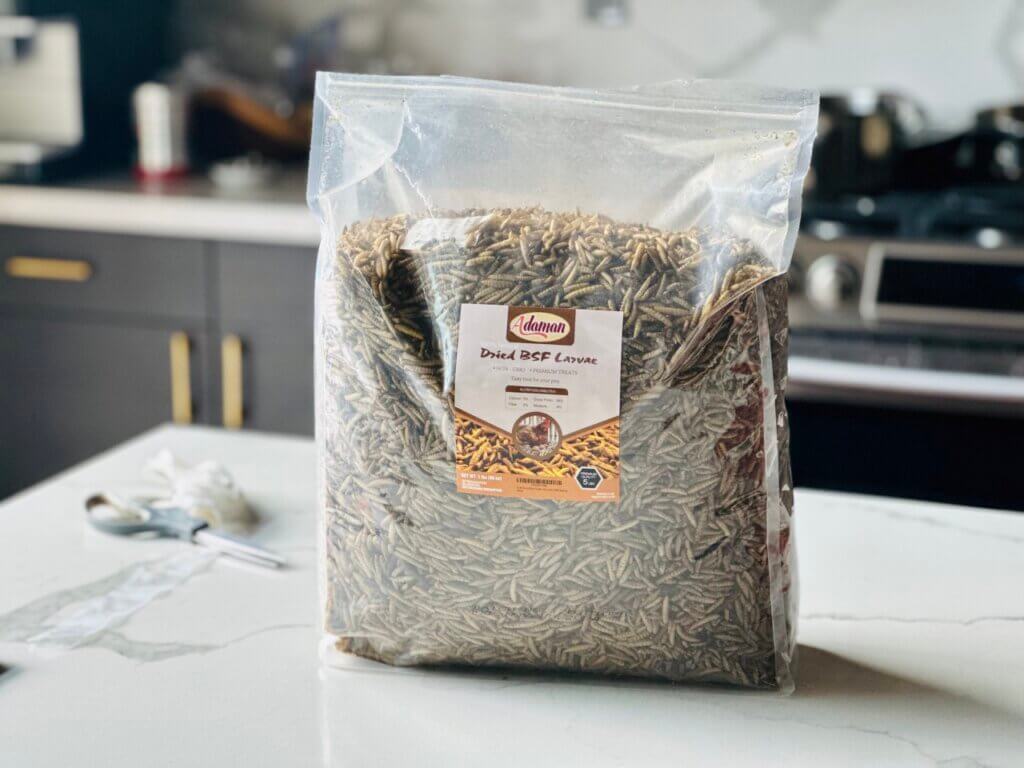
Black Soldier Fly Larvae
Your chickens will go wild for Adaman Dried Black Soldier Fly Larvae! Our chickens LOVE it! This 100% natural, non-GMO chicken food is packed with up to 45% crude protein and 85x more calcium than dried mealworms. It's sustainable, natural, and easy to use - simply toss it on the ground or use it as a topping.
Dairy products. Possible but not ideal.
While some people may suggest giving chickens dairy products like yogurt or milk, it’s essential to approach these foods cautiously. While dairy products can be a source of protein and calcium, they can also cause digestive upset in chickens. Some chickens may be lactose intolerant and unable to digest dairy products properly, resulting in diarrhea or other digestive issues.
While small amounts of dairy may be okay for some chickens, it’s generally not recommended to feed it to them. Instead, it’s best to provide your chickens with other sources of protein and calcium, such as mealworms, eggshells, or greens like kale or collard greens. Probiotics can also benefit chickens, but it’s important to remember that many commercial chicken feeds already contain probiotics.
Dairy products like cheese, milk, butter, and whey don’t provide significant nutritional benefits for chickens and can be replaced with better options. Ultimately, it’s up to you to decide whether or not to feed your chickens dairy products. Still, it’s essential to do so in moderation and to monitor your chickens for any signs of digestive issues.
Bread, pasta, rice. Again, possible but not an idea.
While bread, pasta, and rice are not toxic to chickens, they should be avoided as much as possible. These foods have little nutritional value, are high in calories, and lack fiber.
While chickens can eat some bread, cooked pasta, and rice in moderation, it’s important to remember that these foods should not make up a significant portion of their diet. Additionally, bread can quickly form into a ball and get stuck in a chicken’s crop, which can cause an infection from the sugars and yeast and potentially lead to death.
Instead of relying on these “white” foods, providing your chickens with a well-balanced diet that includes protein, vitamins, and minerals is best. Foods like fresh vegetables, fruits, and whole grains are a much better option, as they provide the necessary nutrients to keep your chickens healthy and happy. When feeding any human food to chickens, it’s essential to do so in moderation and to avoid feeding spoiled or moldy food that can cause illness.
Benefits of feeding treats and snacks to chickens.
Feeding treats and snacks to chickens can provide many benefits. It can help stimulate their minds and provide entertainment, which is especially important for chickens in confined spaces. Feeding treats and snacks can also help increase social bonding between chickens, as they often share the food. Additionally, feeding treats and snacks can help boost their overall nutrition and provide them with essential nutrients they may not get from their regular feed.
Age to start giving chickens treats and snacks.
It’s essential to introduce new foods gradually to young chickens, so it’s best to start feeding them treats and snacks after they are a few weeks old. It’s also essential to choose appropriate foods that are easy for them to digest and won’t pose a choking hazard.
Safe treats and snacks for chickens.
You can feed your chickens many safe treats and snacks, including fruits, vegetables, grains, and mealworms. Fruits and vegetables like apples, carrots, and leafy greens are high in vitamins and minerals, and whole grains like oats and corn provide an excellent source of carbohydrates. Mealworms are also a great source of protein for chickens. However, it’s important to avoid feeding chickens foods like chocolate, caffeine, and avocado, which can be toxic.
Dangers of feeding treats and snacks to chickens.
While treats and snacks can be a fun and beneficial addition to a chicken’s diet, feeding them in moderation and with appropriate food choices is essential. Overfeeding treats and snacks to chickens can lead to obesity, resulting in health issues such as heart disease and joint problems. Excessive treats and snacks can cause digestive issues such as diarrhea and crop impaction.
Feeding inappropriate foods to chickens can also be dangerous and even life-threatening. For example, giving chickens foods high in sugar or fat, such as candy or fried foods, can lead to health problems like diabetes and heart disease. Feeding chickens moldy or spoiled food can cause illness and even death.
It’s important to remember that treats and snacks should comprise only a small portion of a chicken’s diet. Commercial chicken feed is formulated to provide all the necessary nutrients that chickens need, so treats and snacks should be given as a supplement, not a replacement, to their regular diet.
When choosing treats and snacks for your chickens, choose healthy options like fruits, vegetables, and protein sources like mealworms or scrambled eggs. Avoid giving them junk food or foods high in sugar or fat. By feeding your chickens a balanced and varied diet and avoiding dangerous foods, you can help ensure they stay healthy and happy.
DIY hanging chicken treats in a net.
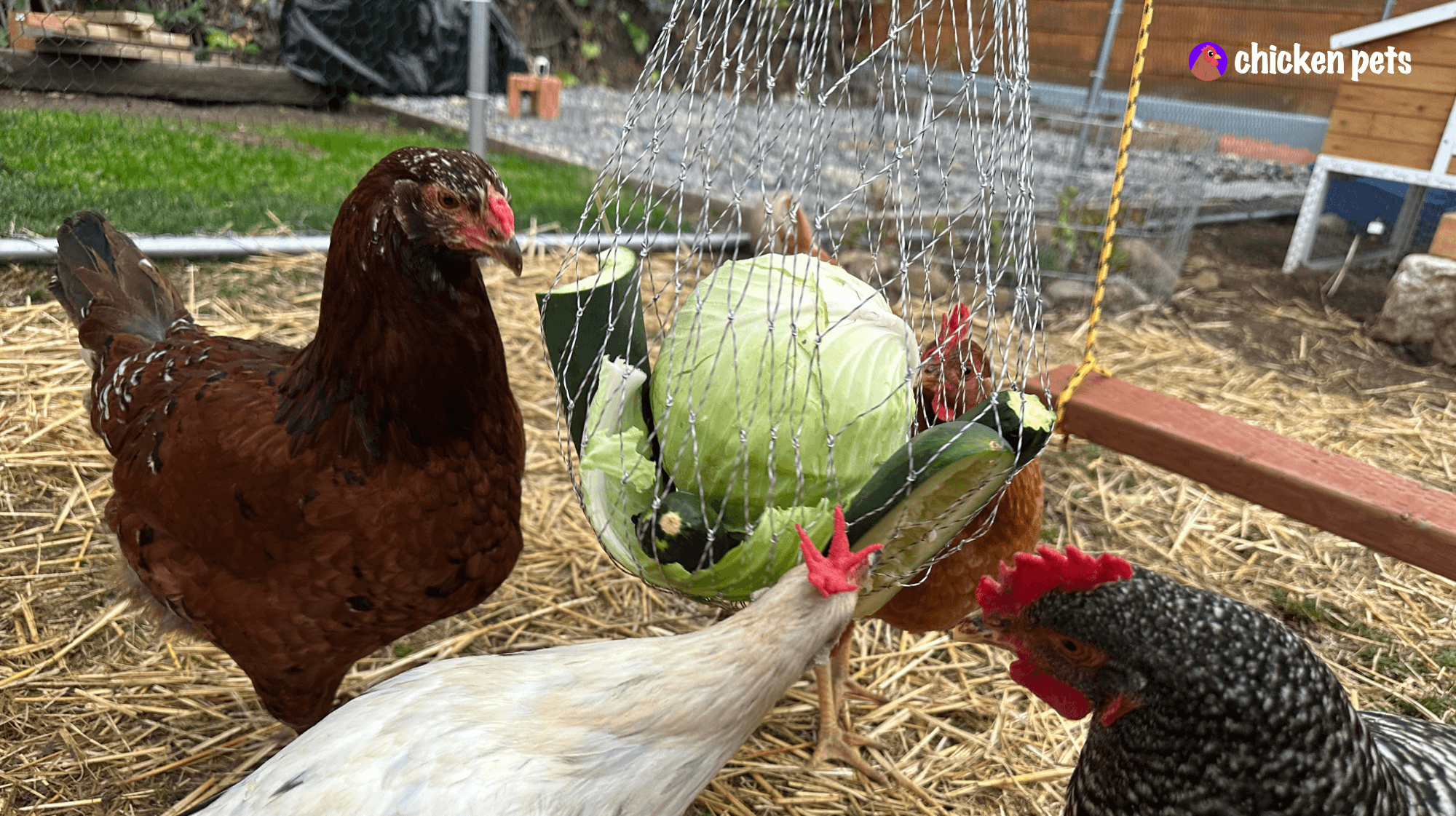
If you’re looking for a fun and easy way to treat your chickens, consider hanging chicken treats in a net. This simple project requires only a few supplies and can be completed in just a few minutes.
Supplies Needed:
- Mesh produce bag or netting material
- Scissors
- String or twine
- Treats (fruits, vegetables, or protein sources)
Step-by-step Instructions:
- Begin by cutting a mesh produce bag or netting material to the desired size. A small bag or piece of netting will work best for hanging treats.
- Next, cut a string or twine long enough to hang the netting from a tree branch or other sturdy object.
- Tie the string or twine securely to the top of the netting.
- Fill the netting with treats, leaving enough space for the goodies to move freely.
- Tie the bottom of the netting closed using another piece of string or twine.
- You can hang the netting from a tree branch or other sturdy object, ensuring it’s at a height your chickens can reach.
Your chickens will love pecking at the hanging treats in the net, and the netting will provide a fun and stimulating activity for them. When eating from the net, monitor your chickens to ensure they don’t accidentally ingest any strings or twine. Additionally, only provide the netting with safe and healthy treats and avoid overfeeding your chickens with too many treats. With this simple project, you can give your chickens a fun and nutritious way to enjoy their treats.
If you don’t want to make your own, we recommend this one:
WE RECOMMEND
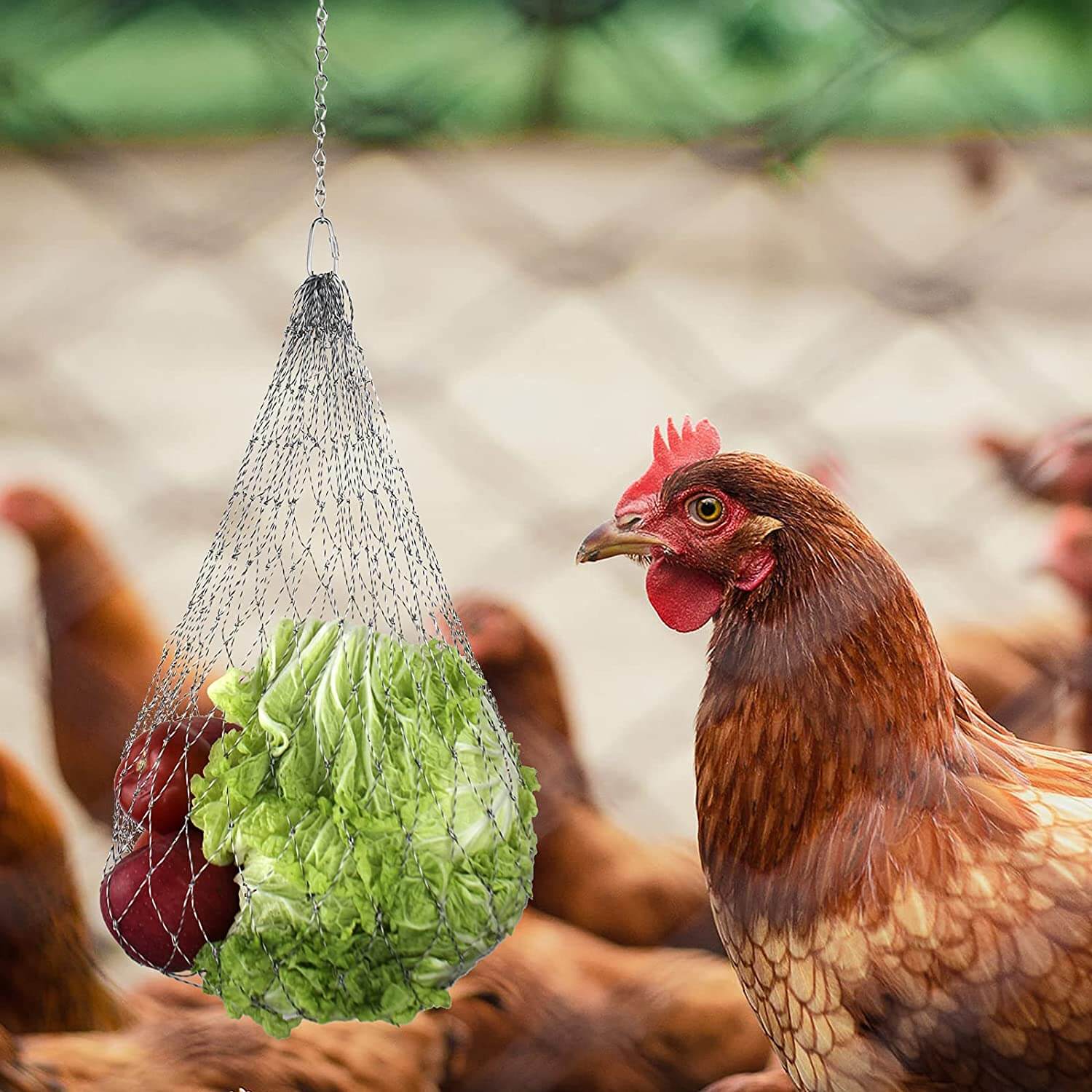
Hanging Feeder Net for Chicken Treats
As chicken owners, we highly recommend this bird treat holder! We've been using it and absolutely love it. Fill it with fruit, vegetables, and treats and your chickens will love it!
What is a chicken flock block?
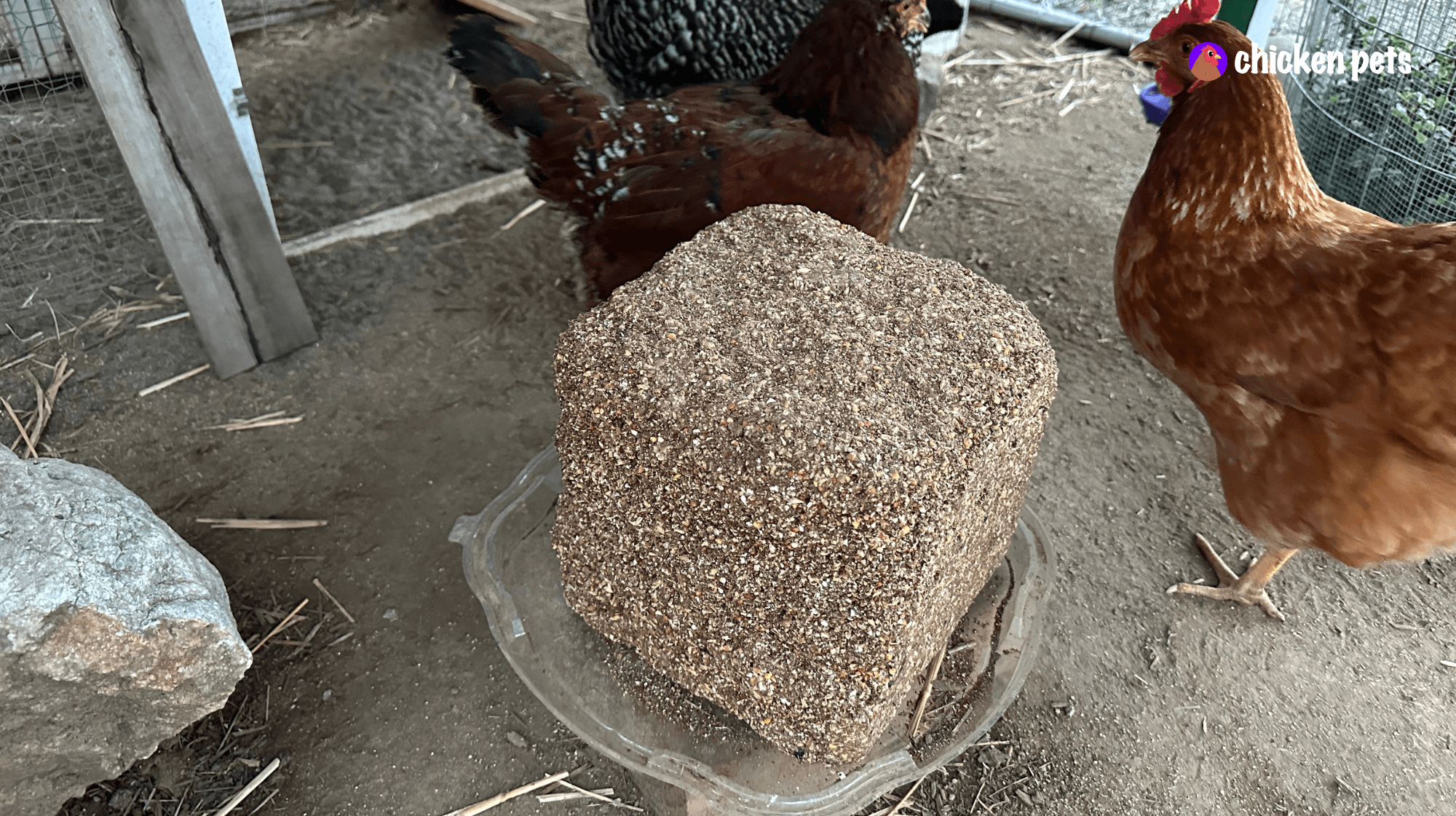
A chicken flock block is a feed supplement designed to provide essential nutrients to chickens. It’s a large, compressed block made from a combination of grains, seeds, vitamins, and minerals that chickens can peck at throughout the day.
Flock blocks are a convenient way to ensure your chickens get all the nutrients to stay healthy. They’re instrumental when chickens need access to various food sources or you cannot provide fresh fruits and vegetables daily.
In addition to providing essential nutrients, flock blocks can also help prevent boredom and aggression among chickens. Pecking at the block offers a stimulating activity for chickens and can help reduce feather pecking and other negative behaviors.
When selecting a flock block, choosing one appropriate for your chickens’ age and dietary needs is essential. Some blocks are designed for young or adult chickens, while others are formulated for layers or meat birds. Additionally, it’s necessary to ensure that the block is made from safe and high-quality ingredients and to avoid blocks that contain artificial colors or flavors. By providing your chickens with a high-quality flock block, you can help ensure they stay healthy and happy.
Related FAQs about feeding chickens and snacks.
Feeding chickens a healthy and balanced diet is essential for their health and well-being. However, many chicken owners question what foods are safe and appropriate for their feathered friends. This article will address some of the most commonly asked questions about feeding chickens and snacks. From what types of foods to avoid to how often to offer treats, we’ll provide the answers you need to keep your chickens healthy and happy.
What foods make chickens happy?
Chickens can be happy with various foods, but some of their favorite treats include mealworms, black soldier fly larvae, fruits, and vegetables. Additionally, chickens love to scratch and peck at the ground, so scattering treats like seeds or cracked corn can provide them with a fun and stimulating activity.
Can I give my chickens treats every day?
While treats can be a fun and healthy addition to a chicken’s diet, feeding them in moderation is essential. Too many treats can lead to obesity and health problems, so it’s best to limit treats to a few times per week and to make sure they make up only a small portion of their overall diet.
How do you give chickens treats?
There are many ways to give chickens treats, but one popular method is to scatter them on the ground for the chickens to peck at. You can also hang treats like vegetables or fruit on a string or wire for chickens to peck at or put them in a treat dispenser that chickens can peck at to release the treats.
What to give chickens to keep them entertained?
Chickens can get bored quickly, so providing them with various treats and toys can help keep them entertained. Some popular chicken toys include hanging cabbage or lettuce, a mirror for them to admire themselves, or a hanging treat dispenser to peck at.
What are chickens’ favorite snacks?
Chickens have a variety of favorite snacks, but some of their favorites include mealworms, black soldier fly larvae, fruits like watermelon and strawberries, vegetables like kale and carrots, and protein sources like scrambled eggs or cooked chicken.
What scraps can chickens not eat?
While chickens can eat a variety of food scraps, some foods should be avoided. These include anything moldy or spoiled, avocado pits or skins, chocolate, caffeine, citrus fruits in large amounts, and anything high in salt or sugar.
Can chickens have peanut butter?
While peanut butter is not toxic to chickens, giving it to them is not recommended as a treat. Peanut butter is high in fat and calories and can be difficult for chickens to digest.
How do you mentally stimulate chickens?
Mentally stimulating chickens is essential to prevent boredom and negative behaviors. Providing them with toys treats, and activities like pecking at a hanging treat dispenser can help keep them mentally engaged. Additionally, letting them free-range and providing them with various perches and hiding spots can provide mental stimulation.
Can you give chickens unlimited food?
While leaving food out for your chickens all day may be tempting, feeding them in moderation is essential. Giving chickens unlimited food can lead to overeating, obesity, and other health issues. Additionally, if food is left out for too long, it can spoil or attract pests, posing a health risk to your chickens.
Can chickens go all night without food?
Chickens can typically go without food for one night without any issues. However, ensuring they have access to fresh water at all times is essential, as dehydration can be dangerous for chickens.
Should chickens have food available at all times?
While chickens should have access to food throughout the day, feeding them in moderation is essential to prevent overeating and obesity. A good rule of thumb is to provide chickens with enough food to last the day but to avoid leaving food out overnight or for extended periods.
What do chickens like to play with?
Chickens are naturally curious and enjoy playing with a variety of objects. Some popular toys for chickens include hanging mirrors, swings, and balls. They also enjoy pecking at and scratching in the dirt, so providing them with a designated dust bath area can be fun.
When can I give my chickens snacks?
You can give your chickens snacks anytime, but it’s essential to do so in moderation. Too many snacks can lead to overeating and obesity, so balancing treats with a healthy diet is vital.
Can chickens eat oatmeal?
Yes, chickens can eat oatmeal. Oatmeal is a nutritious food that provides carbohydrates, protein, and fiber. However, it’s important to avoid feeding chickens flavored oatmeal or oatmeal with added sugars or other ingredients.
How many snacks should I give them?
The number of snacks you give your chickens will depend on their dietary needs and activity levels. Generally, snacks should comprise at most 10% of their daily diet. Choosing healthy snacks like fruits, vegetables, and protein sources is also essential.
Will feeding snacks affect egg laying?
Feeding snacks in moderation should not affect egg-laying in chickens. However, providing too many snacks or unhealthy treats can lead to obesity and other health issues, impacting egg production.
Can chickens eat meat?
Yes, chickens can eat meat, and commercial chicken feeds contain animal by-products like fish, heart, and bone meal. However, it’s essential to feed them in moderation and to avoid feeding them raw or spoiled meat, which can be dangerous and even deadly. Additionally, it’s crucial to balance meat with other food sources like vegetables and grains to ensure a balanced diet.
Incorporating treats and snacks into a chicken’s diet
To incorporate treats and snacks into a chicken’s diet, it’s essential to do so gradually and in moderation. You can use treats and snacks to promote good behavior and training by rewarding them with a treat for performing specific actions or behaviors.
In conclusion, feeding treats and snacks to backyard chickens can provide many benefits, but it’s essential to do so in moderation and with appropriate food choices. Following the 90/10 rule for chicken feed and choosing safe and nutritious treats and snacks, you can keep your chickens healthy, happy, and entertained.

